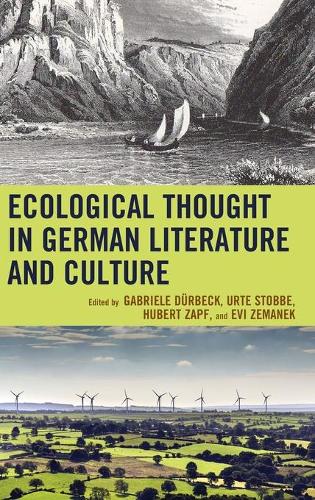
Ecological Thought in German Literature and Culture
(Hardback)
Available Formats
Publishing Details
Ecological Thought in German Literature and Culture
By (Author) Gabriele Duerbeck
Edited by Urte Stobbe
Edited by Hubert Zapf
Edited by Evi Zemanek
Contributions by Aaron S. Allen
Contributions by Martin Bemmann
Contributions by Hannes Bergthaller
Contributions by Benjamin Bhler
Contributions by Nils Bttner
Contributions by Axel Goodbody
Bloomsbury Publishing PLC
Lexington Books
16th October 2017
United States
Classifications
Professional and Scholarly
Non Fiction
Literary studies: general
830.9355
Physical Properties
Hardback
484
Width 158mm, Height 238mm, Spine 31mm
821g
Description
The volume offers a survey of the contribution of German literature and culture to the evolution of ecological thought. As the field of ecocritical theory and practice is rapidly expanding towards transnational and global dimensions, it seems nevertheless necessary to consider the distinct manifestations of ecological thought in various cultures. In this sense, the volume demonstrates in twenty-six essays from different disciplines how German literature, philosophy, art, and science have contributed in unique ways to the emergence of ecological thought on national and transnational scale. The volume maps the most important and characteristic of these developments both on a theoretical and on a textual-analytical level. It is structured in five parts ranging from proto-ecological thought since early modern times (part I) to major theoretical approaches (part II), environmental history (part III), and ecocritical case studies (part IV), to ecological visions in different media and art forms (part V). The four editors have widely published and are actively involved in ecocritical literary and cultural studies. The group of editors consists of two scholars of German literature and cultural studies, Gabriele Duerbeck and Urte Stobbe (both University of Vechta), a scholar in German and comparative literature, Evi Zemanek (University of Freiburg), as well as a scholar of Anglo-American ecoliterature and ecocriticism, Hubert Zapf. All of them are involved in various projects and research networks on ecology and literature. The contributors of the individual chapters likewise are all experts in their respective fields, ranging from German literature, history, environmental studies, art history, music and art. The book is a unique and readily accessible collection of essays that is of relevance not only for a German and continental European but for a worldwide audience.
Reviews
This broad and comprehensive survey of German ecological thought is an especially welcome addition to the growing body of scholarship on the environment in the German tradition. Many prominent critics discuss the most crucial aspects from proto-ecological models to environmental theory, history, literature, and art--a must read for everyone interested in ecology and German culture. -- Sabine Wilke, University of Washington
At a time when the tension between the local and the global requires that we reconsider our multiple roots and porous place-identities, Ecological Thought in German Literature and Culture is a canonic work that enriches not just 'nationally-oriented' academic studies, but also the entire debate on environmental culture. Skillfully encompassing theoretical approaches, philosophy, history, literature, and the arts, this elegant and challenging volume is the most complete and state-of-the-art guide to examine German culture through the lens of the environmental humanities. -- Serenella Iovino, Professor of Comparative Literature, University of Turin, Italy
Author Bio
Gabriele Drbeck is professor of literature and cultural studies at University of Vechta. Urte Stobbe is postdoctoral fellow and lecturer in the field of German literature and linguistic at University of Vechta. Hubert Zapf is professor of American literature and co-director of environmental humanities research at the University of Augsburg. Evi Zemanek is associate professor of German literature and interart studies at the University of Freiburg.
